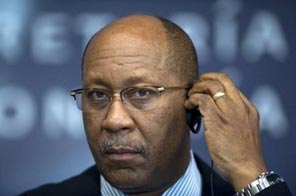US seeks China, India, Brazil info on Doha deal
WASHINGTON: The United States asked nations like China, India and Brazil on Monday to clarify their market-access measures in a bid to break the deadlock on the long-stalled Doha Round of global trade talks.
President Barack Obama's top trade envoy Ron Kirk said that while the United States was forthcoming about its market-opening commitments, it was unsure how much Americans would benefit from reciprocal steps by advanced developing nations.
"The value of new opportunities for our businesses, workers, farmers and ranchers remains vague because of the broad flexibilities available to key emerging markets, like China, India, and Brazil, that are fast-growing economies and important markets of the future," he said.
"To achieve further progress, it is essential to gain more clarity in the level of market-access contributions by advanced developing countries, and ensure that the results provide significant market opportunities for American entrepreneurs and workers in agriculture, goods and services."
Such market-access contributions would also underpin the development goals of the Doha talks, given that 70 percent of the tariffs imposed on developing countries had to be paid to other developing countries.
"In terms of what is currently on the table in the Doha negotiations, the value of what the United States would give in market opening, along with a reduction of US agriculture support, is well-known and easily calculable," Kirk said in a report to Congress on Obama's 2010 trade policy agenda.
The extent to which advanced developing economies should lower tariffs and the United States and the European Union should reduce aid to their farmers are among disagreements between developing and developed nations dogging the Doha Round since its launch in 2001.
Deadlines to conclude the talks have been repeatedly missed.
Kirk said the United States remained convinced that a Doha success could be achieved if all major economies were willing to come to the negotiating table.
He also said that Washington remained committed to a "stock-taking" of the Doha negotiations in early 2010, as directed by the Group of 20 leaders of industrialized and emerging nations.
"The United States is committed to ensure that this be done in the most efficient and appropriate format that contributes to further progress," he said.
The World Trade Organization's 153 members are expected to take stock this month of whether the Doha round can be finished in 2010.
Kirk warned that "a weak agreement" would ultimately also weaken the WTO, the global trade watchdog.
Aside from moves to strengthen a rules-based trading system, Obama's 2010 trade policy agenda includes efforts to implement free trade agreements already signed with South Korea, Panama and Colombia and strategies to boost exports to create jobs as the country battles nearly double digit unemployment.
Kirk said that Washington was trying to resolve issues relating to market access for US autos and beef in South Korea, while labor reform and tax transparency matters had to be addressed in Panama.
With Colombia, efforts are being made to beef up the country's labor code and to address violence against labor union officials to ensure that union rights in that country can be fully and freely exercised, Kirk said.
"If these outstanding issues can be successfully resolved, we will work with Congress on a timeframe to submit them for congressional consideration," he said.
The trade deals with the three nations were signed during the administration of Obama's predecessor George W. Bush but had been held up due to opposition from the Democratic-controlled Congress.






